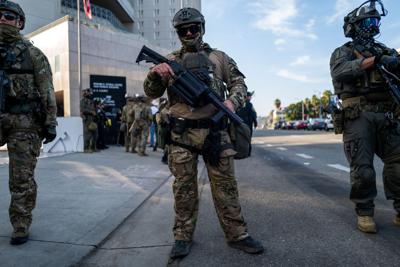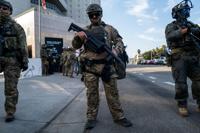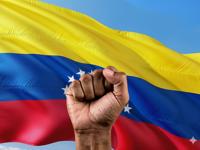
Federal agents guard outside of a federal building and Immigration and Customs Enforcement (ICE) detention center on June 13, 2025, in Los Angeles, California. (Photo by Spencer Platt/Getty Images)
Living in the D.C. Metro area has begun to feel like something out of a dystopian film. Walking through the nation’s capital, you don’t just see Metropolitan Police Department patrol cars—you pass vehicles from a patchwork of law enforcement agencies, sometimes even military-grade equipment. On top of that, many of the people patrolling the streets wear balaclavas or neck gaiters, often without badges or clear identification. At times, it’s nearly impossible to tell which agency they represent and what they’re supposed to be doing.
In response to all the secrecy, activists have begun using AI-powered tools to unmask ICE agents, having reportedly unmasked over 20 agents who appeared in public raids wearing face coverings. Activist groups, like The Crustian Daily, have begun compiling lists with the names of known ICE agents and collaborators in the name of “truth and transparency.” ICE claims its agents need to hide their faces to avoid harassment. Whether this is the case or not, the final product is the same: they get to operate in near-anonymity.
And with this much masking and so little transparency, how can any of us be certain we’re actually dealing with law enforcement officers and not just some civilian with unfulfilled military fantasies, dressed in camouflage and a bulletproof vest?
Though law enforcement officers are not legally required to display identification while on patrol, federal statutes do require them to show visible identification when responding to “civil disturbances.” This is something they seem to have forgotten about, as some have very blatantly been covering their faces and badge numbers during protests and raids
There’s a double standard on the mask issue.
In 2024, Virginia’s attorney general reinstated a pre-pandemic section of the state code that prohibits anyone over 16 from wearing a mask, hood, or device that conceals their identity in public or on private property without consent. Working at George Mason University at the time, I saw this decision cause uproar across campus. Staff worried about how to enforce it in daily interactions, while student organizations—many of which were, and still are, outspoken against the occupation and genocide of the Palestinian people—saw it as a direct attempt to silence/punish them.
And Virginia isn’t alone. South Carolina, Georgia, West Virginia, Florida, Louisiana, Minnesota, New Mexico, Delaware, Michigan and Tennessee have similar laws, with Tennessee’s specifically tied to “intimidation” in the exercise of civil rights. These statutes, relics of anti-Klan legislation, are now being weaponized against a different population: activists, protestors and students exercising their First Amendment rights.
Somehow these restrictions seem to apply only to the general public. The bias here is glaring.
But when we weigh the risks, who is truly vulnerable?
Protestors face chemical attacks, doxxing and even political retaliation. Migrants live under the threat of family separation, detention and deportation. Meanwhile, armed officers get to act with impunity while violently – and without warrants – abducting people off the street, shielded from scrutiny; their safety seems to be of higher priority than that of the everyday person.
This trend is not isolated to the federal level. States are taking steps toward law enforcement protections; Louisiana last year passed a “buffer zone” law, making it a misdemeanor to knowingly approach within 25 feet of a police officer carrying out official duties. The Department of Homeland Security has argued that warning communities about impending ICE raids could itself be treated as interference with law enforcement—potentially a felony. These measures reinforce the power differential between state agents and civilians, eroding accountability and undermining constitutional protections.
Legal precedent clearly states that immigration violations are civil, not criminal offenses. In Fong Yue Ting v. United States (1893), the Supreme Court ruled that deportation is not punishment for a crime. Unlawful presence may lead to removal proceedings and fines, but it is not an offense requiring prosecution. Criminal offenses are “wrongs against society,” requiring punishment. Civil offenses are meant to be resolved, not used as justification for treating people like criminals.
And yet here we are. As ICE’s former acting director and presently the White House’s “Border Czar,” Thomas Homan told CNN last month, that agents “don’t need probable cause to briefly detain and question someone—they just need reasonable suspicion,” though he did not elaborate on what exactly the metrics for “reasonable suspicion” are. This is the architecture of a surveillance state: civilians punished for covering their faces at a protest, while agents of the state conceal theirs during raids. And tellingly, these laws are not just about masks; they are about who is allowed to wield the tools of surveillance. The state can (and does) record, monitor and track ordinary people without consequence, but when citizens take advantage of the same toolkit, by filming police, documenting raids or even masking to protect themselves, they are met with bans, threats and criminalization.
It is hypocrisy in its purest form. Laws designed to protect constitutionally given rights and the public as a whole are now being weaponized, criminalizing dissent and shielding those with the most power from accountability. The masks the people get punished for wearing are the same ones shielding the state from accountability in the name of “public order.”











(0) comments
Welcome to the discussion.
Log In
Keep it Clean. Please avoid obscene, vulgar, lewd, racist or sexually-oriented language.
PLEASE TURN OFF YOUR CAPS LOCK.
Don't Threaten. Threats of harming another person will not be tolerated.
Be Truthful. Don't knowingly lie about anyone or anything.
Be Nice. No racism, sexism or any sort of -ism that is degrading to another person.
Be Proactive. Use the 'Report' link on each comment to let us know of abusive posts.
Share with Us. We'd love to hear eyewitness accounts, the history behind an article.